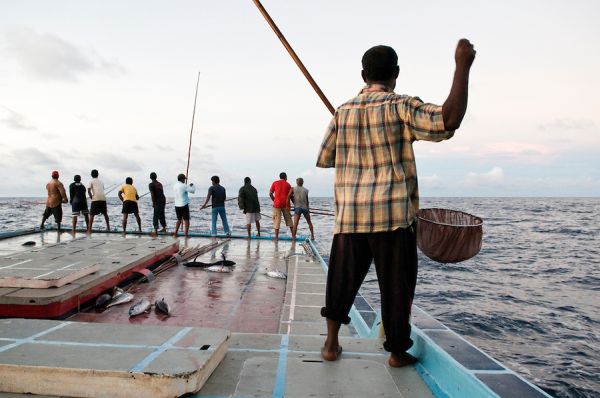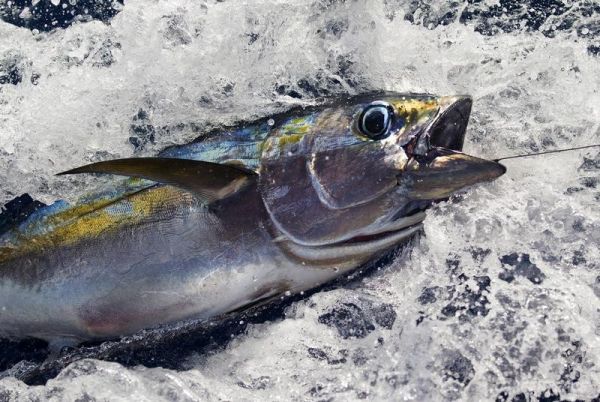Tuna ranks No. 1 as the World’s most favorite fish and the beautiful shores of Maldives in the Indian Ocean is one of the world’s leading platforms that provide approximately 100,000 tons out of the 400,000 world global tuna production annually. So tuna fishing is big business but the way it is caught is also crucial in terms of the impact it has on its surroundings. The major portion of tuna fishing in the world currently is done by the large scale hi-tech industrial fishing techniques that threaten not only the local traditional fishing communities but also the fish stock and marine life of our planet.
The century old ‘pole and line’ fishing method that accounts for 10% of the world’s total tuna catch is a technique that has remained unchanged over decades and is now considered as one of the most sustainable means of fishing both in environmental as well as socio-economic terms. A technique that involves providing live bait and then using hooked lines attached to poles to catch tuna one by one by fishermen on boats, it is the perfect answer to the sustainability question.
Maldives Tuna Fishing Industry
Maldivians are intimately linked to the ocean for generations for work and livelihood. The second largest industry after tourism, fishing provides for more than half the employment of the entire country. While tourism brings in more money to the country, fishing is the greatest employer with the thriving tuna export industry shipping to popular UK shelves such as M&S, Sainsbury’s, Reel Fish and Fish 4 Ever.
The Problems
The recent and extremely grave issues that are being witnessed in the tuna fishing industry are threefold in nature and are almost always due to the use of industrial fishing techniques in large scale just outside the EEZ (Exclusive Economic Zone) of Maldives.
Decline in Fish stock: Sharp decline in the most popular form of tuna skipjack, due to the extensive use of large foreign purse seniers and FAD (Fish Aggregation Devices) technology for mass harvesting of fish all along the Maldivian EEZ is one of the biggest problems that the country’s fishing industry is facing.
Threat to Marine Ecology: Due to the use of FAD fishing methods which uses large nets to catch huge quantity of fishes all at once, the bycatch levels of other marine species are dangerously high. Starting form turtles, sharks, rays, to dolphins, seabirds, whales, etc all kinds of other fishes and animals are destroyed on account of these hi-tech seine fleets and long liners.
Threat to Maldivian Locals: Since these large seiners are all operated by large companies from rich industrial fishing nations, the local coastal population derives very little if not no economic benefits from the same. Moreover, for countries like Maldives where fishing is the greatest employer, there looms a large threat.
Pole and Line Fishing: Sustainability Factor
Shifting to the pole and line technique of fishing is the only sustainable choice since it results in:
- Less killing of marine species such as turtles, dolphins, whales and sharks
- The rate of fishing can be held at sustainable levels where the rate of catching fish does not go hugely above the level at which Mother Nature can replenish them. According to United Nations, the fishing fleet of the world is currently 2.5 times than what it should be in order to be sustainable.
- Threatened tuna species such as the bigeye, yellowfin and also skipjack to a certain extent would be saved from gradual extinction
- More local fishermen from coastal states would get employment and the socio-economic aspects of small fishing nations would not be threatened.
- Developing Coastal Nations would not face an axe and would be a part of the $5 billion profits that the global tuna industry is currently making.
So next time you go to buy a can of tuna, you know which one you need to choose if you want to save the world in your little way. With big brands offering pole and line tuna products at much lesser price nowadays, your support for the sustainability cause is not a problem at all!




